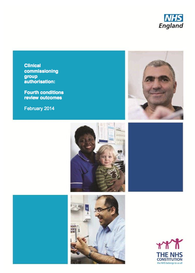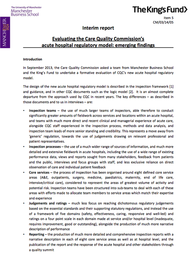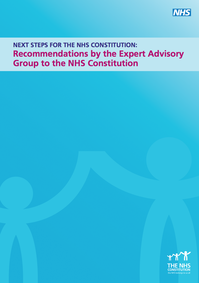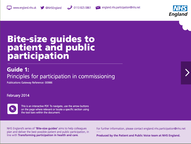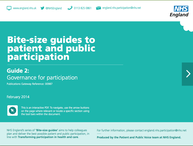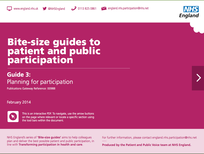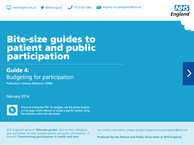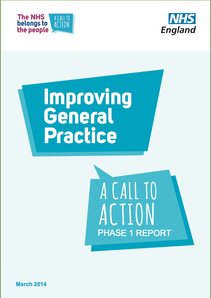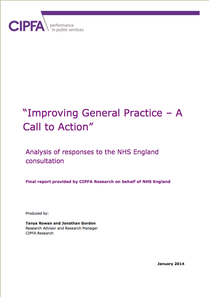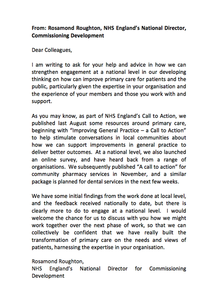NEWS - MARCH 2014
INFORMATION ALONE IS NOT ENOUGH - IT MUST BE USED
Collecting data on patient experience is not enough: they must be used to improve care.
The NHS has been collecting data on patients’ experience of care for over 10 years but the information is often ignored.
bmj.com today, Angela Coulter, Associate Professor at Oxford University and colleagues argue that this is “unethical” and call for a coordinated approach to use the information to help improve services.
Click here to read further ...
Collecting data on patient experience is not enough: they must be used to improve care.
The NHS has been collecting data on patients’ experience of care for over 10 years but the information is often ignored.
bmj.com today, Angela Coulter, Associate Professor at Oxford University and colleagues argue that this is “unethical” and call for a coordinated approach to use the information to help improve services.
Click here to read further ...
RAIDING THE PUBLIC HEALTH BUDGET
Ring-fenced funds to promote public health are being diverted to wider council services such as social care and housing to plug gaps caused by government cuts, finds a BMJ investigation today.
Click here to read further ...
Ring-fenced funds to promote public health are being diverted to wider council services such as social care and housing to plug gaps caused by government cuts, finds a BMJ investigation today.
Click here to read further ...
PPGs CONTINUE TO BE 'FUNDED' FOR ANOTHER YEAR
Enhanced services (ES) 2014/15
In addition to the above, the following existing ESs will be extended for one year to 31 March 2015.
http://www.nhsemployers.org/PayAndContracts/GeneralMedicalServicesContract/DirectedEnhancedServices/Pages/EnhancedServices.aspx
Enhanced services (ES) 2014/15
In addition to the above, the following existing ESs will be extended for one year to 31 March 2015.
- The Patient Participation scheme will be extended for a further year, but with the requirement to carry out a local survey removed. This is due to the introduction of the Friends and Family Test.
- The Extended Hours Access scheme will be extended for a further year with a number of flexibilities included to allow practices to work together to provide the most appropriate service for their patients.
- The Dementia, Alcohol and Learning Disabilities schemes will be extended for a further year with some changes made to each.
http://www.nhsemployers.org/PayAndContracts/GeneralMedicalServicesContract/DirectedEnhancedServices/Pages/EnhancedServices.aspx
GP INVOLVEMENT IN CCGs IS FAILING
28 March 2014
GP representation on CCG boards has substantially decreased since commissioning groups were in shadow form, with GPs now making up the majority of board members at just 29% of CCGs, new figures exclusively obtained by Pulse reveal.
The data, collected by the TUC-funded campaign group False Economy, is the most comprehensive analysis to date of the make-up of fully-fledged CCG boards. It reveals that GPs constitute some 43% of all board members - down from 49% in 2012 - and that the proportion of boards where GPs are in the majority has almost halved over the same period, from 56% to 29%.
Andrew Lansley, the health secretary who introduced the Health and Social Care Act, told GPs the original purpose of the reforms was to ‘give you and your colleagues in general practice the responsibility to shape services’.
But GP leaders have said that these latest figures support the growing feeling that CCGs are ‘more like PCTs, with strong managerial diktats’, at the same time as one of the country’s most senior GP commissioner leaders told Pulse that ‘centralism’ is threatening to ‘destroy’ primary care.
Researchers from False Economy began looking in December at the constitution of all 212 CCG boards, based on information on their websites, which CCGs must display. They recorded whether each board member was a GP, hospital doctor, manager, nurse, lay member, public health doctor or a pharmacist, and also counted members of the voluntary sector, local authorities and Healthwatch.
The researchers found that 1,343 of the total 3,120 CCG board members were GPs, and that GPs were in the majority of just 61 boards. After GPs, NHS managers - non-clinical CCG staff - were the next most widely represented group, making up 21% of board members. Nurses made up 7% of board members, and hospital doctors 6%.
28 March 2014
GP representation on CCG boards has substantially decreased since commissioning groups were in shadow form, with GPs now making up the majority of board members at just 29% of CCGs, new figures exclusively obtained by Pulse reveal.
The data, collected by the TUC-funded campaign group False Economy, is the most comprehensive analysis to date of the make-up of fully-fledged CCG boards. It reveals that GPs constitute some 43% of all board members - down from 49% in 2012 - and that the proportion of boards where GPs are in the majority has almost halved over the same period, from 56% to 29%.
Andrew Lansley, the health secretary who introduced the Health and Social Care Act, told GPs the original purpose of the reforms was to ‘give you and your colleagues in general practice the responsibility to shape services’.
But GP leaders have said that these latest figures support the growing feeling that CCGs are ‘more like PCTs, with strong managerial diktats’, at the same time as one of the country’s most senior GP commissioner leaders told Pulse that ‘centralism’ is threatening to ‘destroy’ primary care.
Researchers from False Economy began looking in December at the constitution of all 212 CCG boards, based on information on their websites, which CCGs must display. They recorded whether each board member was a GP, hospital doctor, manager, nurse, lay member, public health doctor or a pharmacist, and also counted members of the voluntary sector, local authorities and Healthwatch.
The researchers found that 1,343 of the total 3,120 CCG board members were GPs, and that GPs were in the majority of just 61 boards. After GPs, NHS managers - non-clinical CCG staff - were the next most widely represented group, making up 21% of board members. Nurses made up 7% of board members, and hospital doctors 6%.
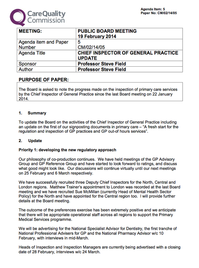
CQC TO NOT GOOD AT INVOLVING THE PUBLIC
24 February, 2014
The Care Quality Commission has said it is reviewing how it can engage more effectively with members of the public.
A paper presented at the care regulator’s board meeting last week says a review will be led by director of engagement Chris Day into “how CQC involves the public and people in its inspection process”.
The CQC has put engagement with the public at the heart of the new inspection regimes which are currently being rolled out across hospitals, general practice and adult social care.
In a change from previous practice, the CQC has increased the use of “experts by experience” – people with knowledge of care from a service user’s perspective – to help inspect services. The paper presented to the board confirms that the role of these individuals during inspections will be included in the review.
At the meeting, the Chief Inspector of general practice admitted that for certain services the CQC had not yet found the best method of engaging with members of the public.
Steve Field said: “We’ve not done very well with engaging the public in [GP] out-of-hours services.” He said that at a recent engagement event into out-of-hours services in Birmingham, “we had zero people turn up”, despite local publicity, and at a Bristol event “there were fewer members of the public there than there were CQC”.
Professor Field said the limited attendance at out-of-hours events reflected the lack of knowledge amongst the public about the services, and that the CQC had “to look at the different ways of engaging”.
A CQC spokesman said: “We are improving the way that we involve and engage the public in all aspects of our work, including how we involve people in our inspection process.
“A general principle that we are applying is that ‘one size does not fit all’ – how we involve the public will vary according to the service that we are inspecting as well as the people who use them”.
As part of its drive to bolster these activities, the CQC is currently recruiting for a head of public engagement who will report into the director of engagement.
24 February, 2014
The Care Quality Commission has said it is reviewing how it can engage more effectively with members of the public.
A paper presented at the care regulator’s board meeting last week says a review will be led by director of engagement Chris Day into “how CQC involves the public and people in its inspection process”.
The CQC has put engagement with the public at the heart of the new inspection regimes which are currently being rolled out across hospitals, general practice and adult social care.
In a change from previous practice, the CQC has increased the use of “experts by experience” – people with knowledge of care from a service user’s perspective – to help inspect services. The paper presented to the board confirms that the role of these individuals during inspections will be included in the review.
At the meeting, the Chief Inspector of general practice admitted that for certain services the CQC had not yet found the best method of engaging with members of the public.
Steve Field said: “We’ve not done very well with engaging the public in [GP] out-of-hours services.” He said that at a recent engagement event into out-of-hours services in Birmingham, “we had zero people turn up”, despite local publicity, and at a Bristol event “there were fewer members of the public there than there were CQC”.
Professor Field said the limited attendance at out-of-hours events reflected the lack of knowledge amongst the public about the services, and that the CQC had “to look at the different ways of engaging”.
A CQC spokesman said: “We are improving the way that we involve and engage the public in all aspects of our work, including how we involve people in our inspection process.
“A general principle that we are applying is that ‘one size does not fit all’ – how we involve the public will vary according to the service that we are inspecting as well as the people who use them”.
As part of its drive to bolster these activities, the CQC is currently recruiting for a head of public engagement who will report into the director of engagement.
LAW COMMISSION'S REVIEW OF HEALTH AND SOCIAL CARE PROFESSIONAL REGULATIONS
Letter from: Tim Spencer-Lane, Public Law Team, Law Commission
The Law Commissions' Report and a draft Bill on the regulation of health and social care professionals will be published on Wednesday, 02 April 2014.
The Report will set out a new single legal framework for the regulation of all health and social care professionals, including doctors, dentists, nurses and pharmacists. The reforms aim to sweep away the out-dated and inflexible decision-making processes associated with the current legislation. It will introduce a clear and consistent legal framework which is needed to enable the regulators to uphold their duty to protect the public.
Please do contact me if you have any queries.
Tel: 020 3334 3758
Fax: 020 3334 0201
EM: [email protected]
Web: www.lawcom.gov.uk
Letter from: Tim Spencer-Lane, Public Law Team, Law Commission
The Law Commissions' Report and a draft Bill on the regulation of health and social care professionals will be published on Wednesday, 02 April 2014.
The Report will set out a new single legal framework for the regulation of all health and social care professionals, including doctors, dentists, nurses and pharmacists. The reforms aim to sweep away the out-dated and inflexible decision-making processes associated with the current legislation. It will introduce a clear and consistent legal framework which is needed to enable the regulators to uphold their duty to protect the public.
Please do contact me if you have any queries.
Tel: 020 3334 3758
Fax: 020 3334 0201
EM: [email protected]
Web: www.lawcom.gov.uk
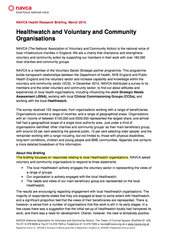
HOW IS LOCAL HEALTHWATCH DOING?
Healthwatch and Voluntary and Community Organisations
NAVCO - 10 pages
NAVCA (The National Association of Voluntary and Community Action) is the national voice of local infrastructure charities in England. We are a charity that champions and strengthens voluntary and community action by supporting our members in their work with over 160,000 local charities and community groups.
Healthwatch and Voluntary and Community Organisations
NAVCO - 10 pages
NAVCA (The National Association of Voluntary and Community Action) is the national voice of local infrastructure charities in England. We are a charity that champions and strengthens voluntary and community action by supporting our members in their work with over 160,000 local charities and community groups.

LINks' INVOLVEMENT OF CHILDREN AND YOUNG PEOPLE
NCB - 43 pages
An exploration of Local Involvement Networks' (LINks) efforts to involve children and young people in their work and in local health and social care issues.
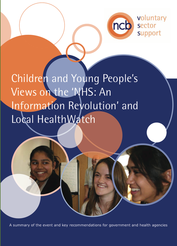
CHILDREN AND YOUNG PEOPLE'S VIEWS ON THE 'NHS: AN INFORMATION REVOLUTION' AND LOCAL HEALTHWATCH
NCB - 17 pages
A summary of the event and key recommendations for government and health agencies
http://www.ncb.org.uk/media/468345/ncb_healthwatch_report_lowres.pdf
NCB - 17 pages
A summary of the event and key recommendations for government and health agencies
http://www.ncb.org.uk/media/468345/ncb_healthwatch_report_lowres.pdf

BRINGING CHILDREN AND YOUNG PEOPLE TO THE HEART OF HEALTHWATCH
Reflections from LINks
NCB- 13 pages
Whatever your starting point, this document – using examples from LINks and Healthwatch pathfinders – should give you some ideas and things to think about for your own locality.” – National Children’s Bureau. For three years the National Children’s Bureau (NCB) was funded by the Department of Health to champion Local Involvement Networks’ (LINks) and local Healthwatch pathfinders’ engagement with children and young people.
This resource pulls together some of the key findings from this project and provides ideas and examples to help you plan how children and young people can be involved in the work of local Healthwatch. NCB worked with 75 different organisations and undertook training and consultancy; policy and advocacy; research; consultations with children and young people; and information and networking provision.
Reflections from LINks
NCB- 13 pages
Whatever your starting point, this document – using examples from LINks and Healthwatch pathfinders – should give you some ideas and things to think about for your own locality.” – National Children’s Bureau. For three years the National Children’s Bureau (NCB) was funded by the Department of Health to champion Local Involvement Networks’ (LINks) and local Healthwatch pathfinders’ engagement with children and young people.
This resource pulls together some of the key findings from this project and provides ideas and examples to help you plan how children and young people can be involved in the work of local Healthwatch. NCB worked with 75 different organisations and undertook training and consultancy; policy and advocacy; research; consultations with children and young people; and information and networking provision.

HEALTHWATCH AND CHILDREN
Bringing children and young people to the heart of Heathwatch
NCB - Scenario Cards - 17
Bringing children and young people to the heart of Heathwatch
NCB - Scenario Cards - 17
STATUTORY DUTY OF CANDOUR
The Duty of Candour will require all health and adult social care providers registered with CQC to be open with people when things go wrong.
This consultation sets out the CQC's proposals and includes a draft of the regulations that will introduce the Duty of Candour.
Click here for the Statutory Duty of Care Consultation
Click here for the Duty of Candour Impact Assessment
This consultation sets out the CQC's proposals and includes a draft of the regulations that will introduce the Duty of Candour.
Click here for the Statutory Duty of Care Consultation
Click here for the Duty of Candour Impact Assessment
COMPLAINTS SUBJECT TO LITIGATION, INQUESTS AND OTHER SERIOUS INCIDENTS
NHS ENGLAND, 24 March 2014
The Local Authority Social Services and National Health Service Complaints (England) Regulations 2009, referred to as the Complaints Regulations 2009, removed a specific exclusion included in the 2004 Complaints Regulations which prevented a complaint from being considered where the complainant had stated in writing that they intended to take legal proceedings.
NHS ENGLAND, 24 March 2014
The Local Authority Social Services and National Health Service Complaints (England) Regulations 2009, referred to as the Complaints Regulations 2009, removed a specific exclusion included in the 2004 Complaints Regulations which prevented a complaint from being considered where the complainant had stated in writing that they intended to take legal proceedings.
FAMILY HEALTH SERVICES APPEAL UNIT - NHS LITIGATION AUTHORITY
The NHS LA is responsible for ensuring a prompt and fair resolution of appeals and disputes between primary care contractors and NHS England. Primary care contractors include GPs, dentists, opticians and pharmacists. This area of work is handled by our Family Health Services Appeal Unit (FHSAU) which encompasses the following services:
Determinations are made by either the Pharmacy Appeal Committee, an Oral Hearing Panel appointed by the NHS LA or an Officer of the NHS LA dependent upon which Regulations apply. For those who wish to refer to them, decision letters issued following consideration of the above are available on this website.
The NHS LA also has certain obligations with regard to Fitness to Practise procedures which are also handled by the FHSAU. These are:
The NHS LA is responsible for ensuring a prompt and fair resolution of appeals and disputes between primary care contractors and NHS England. Primary care contractors include GPs, dentists, opticians and pharmacists. This area of work is handled by our Family Health Services Appeal Unit (FHSAU) which encompasses the following services:
- Determining appeals against decisions in accordance with the NHS (Pharmaceutical Services) Regulations 2005, 2012 and 2013 concerning the provision of NHS pharmaceutical services. Such appeals generally relate to the proposed opening of a new pharmacy, relocation of an existing pharmacy, or the provision of dispensing services by GPs;
- Determining contractual disputes between primary care contractors and NHS England;
- Determining disputes over the assessment of GP Registrars’ allowances under relevant Directions;
- Determining other occasional appeals and applications under various regulations governing primary care
Determinations are made by either the Pharmacy Appeal Committee, an Oral Hearing Panel appointed by the NHS LA or an Officer of the NHS LA dependent upon which Regulations apply. For those who wish to refer to them, decision letters issued following consideration of the above are available on this website.
The NHS LA also has certain obligations with regard to Fitness to Practise procedures which are also handled by the FHSAU. These are:
- Maintaining a database of primary care contractors who have had restrictions placed upon their inclusion on Performers Lists: and
- Carrying out Fitness to Practise checks against the restrictions database.
|
SUMMARY OF THE DECISIONS OF THE CCG ASSURANCE AND AUTHORISATION COMMITTEE held on 17 January 2014
13 pages During 2012/13, NHS England authorised 211 Clinical Commissioning Groups (CCGs) across England, establishing them as new statutory bodies. NHS England published a comprehensive authorisation framework, setting out 119 thresholds that CCGs must meet in order to be fully authorised. Where a CCG was unable to evidence that it met a particular threshold, a condition was placed on its authorisation. Just under half of CCGs had conditions on their authorisation. NHS England reviews CCGs’ authorisation conditions quarterly with a view to removing conditions once it is safe to do so. This document summarises the outcomes of our fourth conditions review. |
|
EVALUATION OF CQC INSPECTIONS
11 pages - The King's Fund In September 2013, the Care Quality Commission asked a team from Manchester Business School and the King’s Fund to undertake a formative evaluation of CQC’s new acute hospital regulatory model. The design of the new acute hospital regulatory model is described in the inspection framework [1] and guidance, and in other CQC documents such as the logic model [2]. It is an almost complete departure from the approach used by CQC in recent years. |
HEALTHWATCH CRITICISES 'INCREDIBLY COMPLEX' COMPLAINTS SYSTEM
20 March, 2014 – HSJ
More than 75 different types of organisation are involved in a confusing health and care complaints system which is discouraging people from raising concerns, according to work done by Healthwatch England. The official national champion of health and social care consumers has compiled an “atlas” of the organisations and groups of people involved in the complaints system.
Healthwatch England Chair, Anna Bradley, said the system was “incredibly complex” and got in the way of people making complaints about poor care. She pointed to a survey for Healthwatch England last year that found more than 54 per cent of people who had a problem with health or social care did nothing to report it. Of these, three in five said this was because they did not know how to make a complaint.
Ms Bradley said this was not only “very frustrating for individuals”, but was also preventing services from improving. “Not only do [people] not get an explanation and a sense of wrongs put right, but also the system itself doesn’t benefit from the learning that always comes from those poor experiences and… can’t make the appropriate improvements.” She said the complexity was exacerbated by the difficulty people experienced to find independent complaints advocacy services. Since April last year these have been the responsibility of local authorities.
Robert Francis QC told the Commons Health Committee last month that advocacy services were “more fragmented” than when he investigated Mid Staffordshire Foundation Trust.
Ms Bradley said there should be a “single, properly resourced but comprehensive advocacy service across the whole of health and social care under one branding”, and that this could be provided by local Healthwatch organisations.
Healthwatch England has also supported the idea of a “no wrong door” principle that, wherever a complaint is made, the system should take responsibility for it. A Department of Health spokesman said: “If people receive poor care it is quite right that they know how to complain and what to expect.”
20 March, 2014 – HSJ
More than 75 different types of organisation are involved in a confusing health and care complaints system which is discouraging people from raising concerns, according to work done by Healthwatch England. The official national champion of health and social care consumers has compiled an “atlas” of the organisations and groups of people involved in the complaints system.
Healthwatch England Chair, Anna Bradley, said the system was “incredibly complex” and got in the way of people making complaints about poor care. She pointed to a survey for Healthwatch England last year that found more than 54 per cent of people who had a problem with health or social care did nothing to report it. Of these, three in five said this was because they did not know how to make a complaint.
Ms Bradley said this was not only “very frustrating for individuals”, but was also preventing services from improving. “Not only do [people] not get an explanation and a sense of wrongs put right, but also the system itself doesn’t benefit from the learning that always comes from those poor experiences and… can’t make the appropriate improvements.” She said the complexity was exacerbated by the difficulty people experienced to find independent complaints advocacy services. Since April last year these have been the responsibility of local authorities.
Robert Francis QC told the Commons Health Committee last month that advocacy services were “more fragmented” than when he investigated Mid Staffordshire Foundation Trust.
Ms Bradley said there should be a “single, properly resourced but comprehensive advocacy service across the whole of health and social care under one branding”, and that this could be provided by local Healthwatch organisations.
Healthwatch England has also supported the idea of a “no wrong door” principle that, wherever a complaint is made, the system should take responsibility for it. A Department of Health spokesman said: “If people receive poor care it is quite right that they know how to complain and what to expect.”
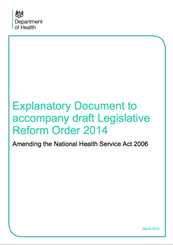
AMENDING THE NATIONAL HEALTH SERVICE ACT 2006
Proposals to amend current legislation to remove administrative burdens on Clinical Commissioning Groups (CCGs) and NHS England.
https://www.gov.uk/government/publications/amending-the-national-health-service-act-2006
Proposals to amend current legislation to remove administrative burdens on Clinical Commissioning Groups (CCGs) and NHS England.
https://www.gov.uk/government/publications/amending-the-national-health-service-act-2006
CLINICAL COMMISSIONING GROUPS AND COUNCILS SET TO POOL MORE THAN £5b in 2015 - 2016
19 March 2014 - HSJ
Councils and NHS commissioners are set to share pooled budgets of more than £5bn in 2015-16 under the better care fund, HSJ has learned. They have agreed to pool more than a third over and above the £3.8bn they are required to do under the policy, according to early indications in their plans.
The funds will be pooled and overseen by health and wellbeing boards, meaning both councils and clinical commissioning groups will jointly develop plans for and decide how it is used.
Ministers announced the better care fund, initially called the integration transformation fund, in summer last year, saying it would encourage joint working between health and social care services. The Government said there would be a minimum of £3.8bn pooled nationally in 2015-16, £3.4bn of which will be funded by the NHS. The additional £1.4bn has been pledged by a mixture CCGs and local government, HSJ understands, although the Department of Health has not yet completed analysis of the source of or plans for spending the money.
Health and Wellbeing Boards sent draft plans for the use of the fund to NHS England in February and final plans are due next month. Care and Support Minister, Norman Lamb, told HSJ the £5.2bn could rise further, as some health and wellbeing boards had not yet confirmed plans, or were still looking at extending it further. He said early plans were an “encouragement” and said: “I’m delighted that there is that sense of ambition in lots of areas to go well beyond the minimum. The better care fund is acting as a real catalyst for some really dynamic thinking.”
Mr Lamb said plans submitted last month exhibited a “range of quality”. “There’s inevitably variability. Some are brilliant, some are less well developed.” He said NHS England and the DH would work to improve the poorer plans, while being as “collaborative as possible”.
Areas known to be planning to pool more than the minimum required sum include Sunderland, Oxfordshire, and several areas in the West Midlands.
19 March 2014 - HSJ
Councils and NHS commissioners are set to share pooled budgets of more than £5bn in 2015-16 under the better care fund, HSJ has learned. They have agreed to pool more than a third over and above the £3.8bn they are required to do under the policy, according to early indications in their plans.
The funds will be pooled and overseen by health and wellbeing boards, meaning both councils and clinical commissioning groups will jointly develop plans for and decide how it is used.
Ministers announced the better care fund, initially called the integration transformation fund, in summer last year, saying it would encourage joint working between health and social care services. The Government said there would be a minimum of £3.8bn pooled nationally in 2015-16, £3.4bn of which will be funded by the NHS. The additional £1.4bn has been pledged by a mixture CCGs and local government, HSJ understands, although the Department of Health has not yet completed analysis of the source of or plans for spending the money.
Health and Wellbeing Boards sent draft plans for the use of the fund to NHS England in February and final plans are due next month. Care and Support Minister, Norman Lamb, told HSJ the £5.2bn could rise further, as some health and wellbeing boards had not yet confirmed plans, or were still looking at extending it further. He said early plans were an “encouragement” and said: “I’m delighted that there is that sense of ambition in lots of areas to go well beyond the minimum. The better care fund is acting as a real catalyst for some really dynamic thinking.”
Mr Lamb said plans submitted last month exhibited a “range of quality”. “There’s inevitably variability. Some are brilliant, some are less well developed.” He said NHS England and the DH would work to improve the poorer plans, while being as “collaborative as possible”.
Areas known to be planning to pool more than the minimum required sum include Sunderland, Oxfordshire, and several areas in the West Midlands.
|
NHS CONSTITUTION
Recommendations by the Expert Advisory Group to the NHS Constitution 12 pages _______________________ See Pages 7 and 10 ____________________ https://www.gov.uk/government/uploads/system/uploads/attachment_ data/file/289085/Next_Steps_for_NHS_Constitution.pdf |
GUIDES TO PATIENT AND PUBLIC PARTICIPATION - NHS England
http://www.england.nhs.uk/2014/03/13/pat-pub-participation/
http://www.england.nhs.uk/2014/03/13/pat-pub-participation/
MORE NOTICES OF INSPECTIONS OF GPs
GP Practices will be given two weeks’ notice - instead of 48 hours - before a CQC inspection, under major changes to the way visits are carried out from April .
Chief Inspector of primary care, Professor Steve Field, said that the change heralds a ‘new approach’ in the way the CQC works with GP practices, aiming to support them to raise standards.
The current 48-hour notice period proved controversial when it was announced in November 2012, with the CQC reasoning that it prevented practices from ‘overpreparing’, leading to practices having to hire extra staff so they are sufficiently prepared.
However, the regulator has also reserved the right for unannounced inspections to practices identified as being at-risk.
GP Practices will be given two weeks’ notice - instead of 48 hours - before a CQC inspection, under major changes to the way visits are carried out from April .
Chief Inspector of primary care, Professor Steve Field, said that the change heralds a ‘new approach’ in the way the CQC works with GP practices, aiming to support them to raise standards.
The current 48-hour notice period proved controversial when it was announced in November 2012, with the CQC reasoning that it prevented practices from ‘overpreparing’, leading to practices having to hire extra staff so they are sufficiently prepared.
However, the regulator has also reserved the right for unannounced inspections to practices identified as being at-risk.
|
PROPOSALS FOR GPs
32 pages NHS England - new proposals to reform general practice, including a major ‘value for money’ review of rent reimbursement and plans to address the recruitment and retention crisis. |
IMPROVING PRIMARY CARE FOR PATIENTS AND THE PUBLIC - From NHS England
|
IMPROVING GENERAL PRACTICE -
A CALL TO ACTION 74 pages Click here to download ... _________________________________ LETTER from NHS ENGLAND'S NATIONAL DIRECTOR, COMMISSIONING DEVELOPMENT 1 page Click here to download ... |

